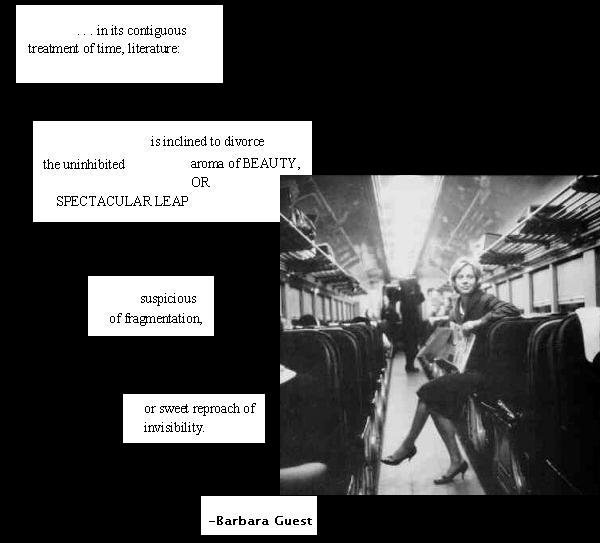“Let me recite what history teaches. History teaches.”
—Gertrude Stein,
The Making of Americans
Since no one asked my opinion, I’ll just go ahead and say that with reservations I agree with Kassie’s notion posted elsewhere that “art” in fact must, yes, be “label-less,” but I think there’s an issue here of good faith that we probably should explore; that is, as long as an artist proceeds in good faith, then hir art must matter. Silliman writes in his 1981 essay, “The Political Economy of Poetry”:
Poetry in America reflects struggle carried out, unfortunately, in an unorganized and often individualistic manner. This struggle is as much one between audiences as it is between poets (or, to be precise, it is one between social formations, including, but never limited to, economic classes, from which audiences are composed around individual authors).
(Goia, Mason and Schoerke 413)
The trouble thus still arises these many years later out of reading, the relationship, more precisely, of reader to text and writer. As audience members we have a limited amount of time. Thus, we have to decide for ourselves what is/is not written in good faith and what we will/will not consume. Given this struggle it seems to me, first, worthwhile for an audience to be invited by a particular text into the role of maker (as is the artist) to collaborate in the process of the thing’s making (for we can at least marginally check our own will toward good faith); second, since readers simply haven’t got time to read/experience everything, an audience member needs to start making some choices. Fire up the cannons, boys! A text which, for example, either supposedly rejects the status quo out of hand with some sort of dashed off, say, “punk” tone of dismissal likely isn’t interesting to me as a reader (nor, certainly, is one which simply reiterates the status quo with wit and pretty rhyme) for both serve in the end to maintain stricture in the political structure.
While I believe their existence is most unfortunate for such objects are either ignored by most or serve to lull a greater audience into a false sense of calm, I’m glad nevertheless that such objects are allowed to exist despite the probability that even if naively, accidentally, such texts likely on at least some level are not written in good faith. This paradox so striking is probably unmatched anywhere else in American experience except perhaps in the viewing of television, for the false sense of peace and safety we feel after sitting back and watching “Deal or No Deal?” causes us to forget—though perhaps “naturally” and without ill will—that things on our planet, still, operate on a practically impossible tilt. Look out the window! Unwinding the bandages from the wound of amnesia, if only for moments, the news networks on their first rotation this morning made a claim that while all eyes were averted over the last decade Russia has manufactured and now tested a missile that could end our decades-long lunch break unhappily, quite. ...a top 40s smash generated by a computer program.
It seems to me in the end that an important role of art is to mirror and to agitate, to expose, to shatter. A responsible artist, one who does not simply operate in a delusional world of self-aggrandizement and pity, knows that, in the words of Louis Althusser:
…ideology “acts” or “functions” in such a way that it “recruits” subjects among the individuals (it recruits them all), or “transforms” the individuals into subjects (it transforms them all) by that very precise operation which I have called interpellation or hailing, and which can be imagined along the lines of the most commonplace everyday police (or other) hailing: “Hey, you there!” (“Reproduction”)
Any poem worthy of "our" attention welcomes difficulty as savagely as a lover’s embrace. A poet ought know this fact as a kiss, deeply; ought holler in a grammar complex madly made to reveal the parts. Tautological thought teaches every possible separation we shoulder against. Village populations starve, whales beach themselves, nameless soldiers tote rifles and rape children. Why vacuum the house? When a man on a motorcycle speeds through a four-way in an instant a pickup takes him out of the intersection by the pound, his brain having leapt from his skull to leak gloriously atomized upon the pavement—grey upon grey punctuated by rose—aspects collide a brave foolery. In good faith, listen: Is that poetry sliding down the rear-view? Paris.
Tonight, on the brink of the sky, in an area we call “Now,” a planet will collapse in on itself to become a star that nothing comprehends ever after. Generations, nothing. What this is/is what this is. Poems built somehow of anything other than such elemental understandings of history display on-screen the labels, in one way or another, of either Wastefully Idiotic Solipsism or Romanticist Falsehood—
dual apartments rent en masse
to address beyond
tears, throw down a challenge
lodged such measures. The monikers
lighting up the power grid.
Work Cited
Althusser, Louis. “On the Reproduction of the Conditions of Production.” Lenin and Philosophy and Other Essays. Tr. Ben Brewster. New York: Monthly Review Press, 1971 http://www.marxists.org/reference/archive/althusser/1970/ideology.htm.
Silliman, Ron. “The Political Economy of Poetry.” (1981). 20th Century American Poetics: Poets on the Art of Poetry. Eds. Dana Goia, David Mason, and Meg Schoerke. New York: McGraw Hill, 2004. 405-13.
Church of the Light by Tadao Ando

Subscribe to:
Post Comments (Atom)


No comments:
Post a Comment